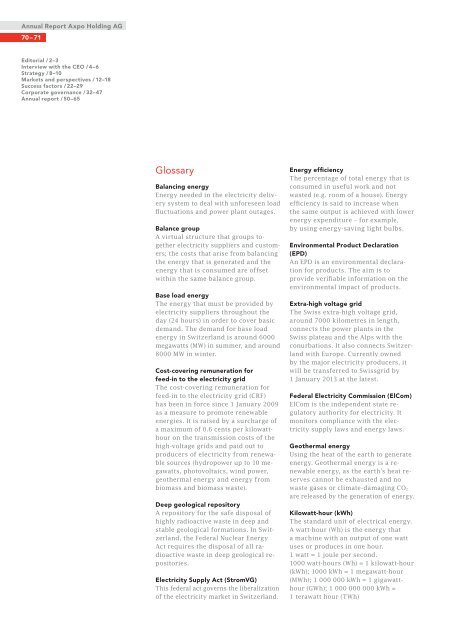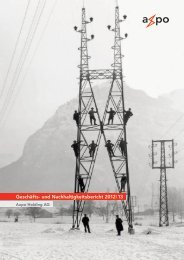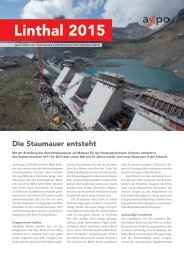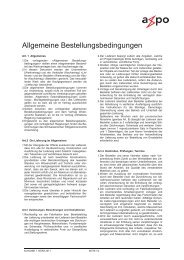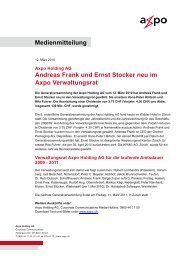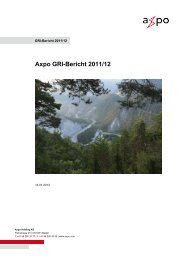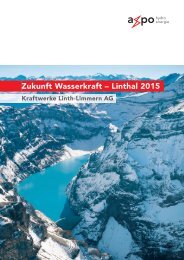Annual report 2008/09 - Axpo Group
Annual report 2008/09 - Axpo Group
Annual report 2008/09 - Axpo Group
Create successful ePaper yourself
Turn your PDF publications into a flip-book with our unique Google optimized e-Paper software.
<strong>Annual</strong> Report <strong>Axpo</strong> Holding AG<br />
70 – 71<br />
Editorial / 2–3<br />
Interview with the CEO / 4–6<br />
Strategy / 8–10<br />
Markets and perspectives / 12–18<br />
Success factors / 22–29<br />
Corporate governance / 32–47<br />
<strong>Annual</strong> <strong>report</strong> / 50–65<br />
Glossary<br />
Balancing energy<br />
Energy needed in the electricity delivery<br />
system to deal with unforeseen load<br />
fl uctuations and power plant outages.<br />
Balance group<br />
A virtual structure that groups together<br />
electricity suppliers and customers;<br />
the costs that arise from balancing<br />
the energy that is generated and the<br />
energy that is consumed are offset<br />
within the same balance group.<br />
Base load energy<br />
The energy that must be provided by<br />
electricity suppliers throughout the<br />
day (24 hours) in order to cover basic<br />
demand. The demand for base load<br />
energy in Switzerland is around 6000<br />
megawatts (MW) in summer, and around<br />
8000 MW in winter.<br />
Cost-covering remuneration for<br />
feed-in to the electricity grid<br />
The cost-covering remuneration for<br />
feed-in to the electricity grid (CRF)<br />
has been in force since 1 January 20<strong>09</strong><br />
as a measure to promote renewable<br />
energies. It is raised by a surcharge of<br />
a maximum of 0.6 cents per kilowatthour<br />
on the transmission costs of the<br />
high-voltage grids and paid out to<br />
producers of electricity from renewable<br />
sources (hydropower up to 10 megawatts,<br />
photovoltaics, wind power,<br />
geothermal energy and energy from<br />
biomass and biomass waste).<br />
Deep geological repository<br />
A repository for the safe disposal of<br />
highly radioactive waste in deep and<br />
stable geological formations. In Switzerland,<br />
the Federal Nuclear Energy<br />
Act requires the disposal of all radioactive<br />
waste in deep geological repositories.<br />
Electricity Supply Act (StromVG)<br />
This federal act governs the liberalization<br />
of the electricity market in Switzerland.<br />
Energy effi ciency<br />
The percentage of total energy that is<br />
consumed in useful work and not<br />
wasted (e.g. room of a house). Energy<br />
effi ciency is said to increase when<br />
the same output is achieved with lower<br />
energy expenditure – for example,<br />
by using energy-saving light bulbs.<br />
Environmental Product Declaration<br />
(EPD)<br />
An EPD is an environmental declaration<br />
for products. The aim is to<br />
provide verifi able information on the<br />
environmental impact of products.<br />
Extra-high voltage grid<br />
The Swiss extra-high voltage grid,<br />
around 7000 kilometres in length,<br />
connects the power plants in the<br />
Swiss plateau and the Alps with the<br />
conurbations. It also connects Switzerland<br />
with Europe. Currently owned<br />
by the major electricity producers, it<br />
will be transferred to Swissgrid by<br />
1 January 2013 at the latest.<br />
Federal Electricity Commission (ElCom)<br />
ElCom is the independent state regulatory<br />
authority for electricity. It<br />
monitors compliance with the electricity<br />
supply laws and energy laws.<br />
Geothermal energy<br />
Using the heat of the earth to generate<br />
energy. Geothermal energy is a renewable<br />
energy, as the earth’s heat reserves<br />
cannot be exhausted and no<br />
waste gases or climate-damaging CO2<br />
are released by the generation of energy.<br />
Kilowatt-hour (kWh)<br />
The standard unit of electrical energy.<br />
A watt-hour (Wh) is the energy that<br />
a machine with an output of one watt<br />
uses or produces in one hour.<br />
1 watt = 1 joule per second.<br />
1000 watt-hours (Wh) = 1 kilowatt-hour<br />
(kWh); 1000 kWh = 1 megawatt-hour<br />
(MWh); 1 000 000 kWh = 1 giga watthour<br />
(GWh); 1 000 000 000 kWh =<br />
1 terawatt hour (TWh)


